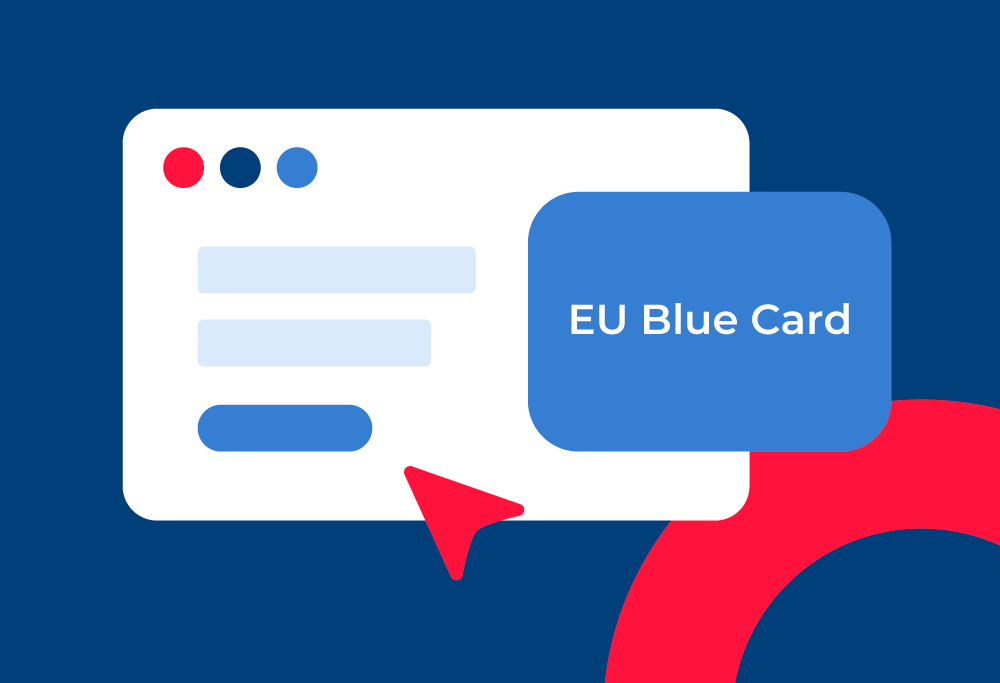Since the founding of the European Union, the ability for employees to work and travel across European national borders has facilitated countless businesses’ entry into new markets quickly and efficiently. However, in order to ensure that the EU is open and available to all talented professionals, not just those from Europe, the EU issued a bloc-wide work permit called the EU Blue Card.
The European Union (EU) as a whole is a leading world economy, boasting a GDP per capita of €25,000 for its 440 million consumers. As the leading trader of manufactured goods and services, the EU is the top trading partner for 80 countries, significantly more than the United States. This extensive trade network and investment leadership of the EU means access to a whole range of markets, from the well-developed to the emerging, and the EU Blue Card has been designed to help foreign talent access these markets.
However, the process and requirements of the scheme are complex, so we suggest ways to apply quickly and securely with the least hassle possible. Here, we explore the benefits and uses of an EU Blue Card for global businesses and provide all the information you need to apply successfully.

Tired of scrolling? Download a PDF version for easier offline reading and sharing with coworkers
What is an EU Blue Card?
The EU Blue Card is a form of residence permit that allows highly qualified non-EU/EEA nationals to live and work in 25 of 27 EU countries (excluding Denmark and Ireland). In effect, EU Blue Cards are the EU equivalent of an American Green Card.
The exact procedures for obtaining these cards depend on the country. Below, we outline the general steps, but specific national details and EU Blue Card requirements can be found on the official website.
Who is the EU Blue Card for?
As this system is reserved for highly qualified workers, this generally means individuals with:
- A paid local employment contract with a defined work period of at least 6 months
- Proof of at least a university-level education and/or at least 5 years of relevant professional experience (depending on the country)
- A gross annual salary of at least 1 to 1.5 times the national average (depending on the country)
- Necessary travel documents and proof of adequate health insurance
Why Would Employees Require EU Blue Cards?
Importantly, not only do these cards allow employees to work and travel within the majority of the EU, but they can also benefit from mandatory social insurance and benefits rights during this time.

What are the Benefits of an EU Blue Card?
The Freedom to Work, Live, and Travel Within Most of the EU
A Blue Card allows you to live in the EU with largely the same rights and benefits as an EU citizen, including access to medical, financial, and educational systems. After living in one country with a Blue Card, you can move to other EU countries (as long as you still meet the Blue Card requirements of the other country).
EU Blue Cards issued outside of Romania, Bulgaria, Cyprus, and Croatia allow for freedom of travel within the entire Schengen area.
The Ability to Enjoy EU Labor Conditions and Rights
With a highly developed system for protecting and furthering workers’ rights, the EU offers some of the best working conditions in the world. Your employees will be able to better appreciate their time in Europe when they are as protected as every other worker around them.
Extendable Rights to Family Members and Dependents
Transferring workers abroad always brings up difficult questions about family situations and the expenses and complications of relocation. A Blue Card allows much of this to be avoided by providing the same rights to live and work to the immediate family members of a holder.
Profit from Fast-Tracks to Permanent Residency
Many EU countries offer simplified permanent residence procedures and timelines for Blue Card holders, which can be particularly advantageous if you are planning to send employees to the EU to manage long-term projects or establish branch offices.
How Can I Get an EU Blue Card?
While each country has specific requirements and steps, here we outline the general process you’ll have to follow, as well as some commonly asked questions:
What Does the EU Blue Card Application Process Involve?
Rather than describe the exact requirements particular to all 25 eligible states, here we’ve summarized the key parts of each step of the process.
- Submit an Application Form – This is done either through the nearest consulate of your destination country or online, depending on the country you are applying to. Most countries allow for application by a third party.
- Meet the Criteria:
You hold a University Degree or equivalent qualification.
You have a minimum of 5 years of experience in your field and possess all the required licenses or additional qualifications necessary for your job.
You can prove an established work contract or a job offer of at least 6 months with a company in the EU and which complies with national contract minimums.
You meet the EU Blue Card minimum salary threshold for your intended country.
- Consulate Meeting – Applicants who meet the minimum requirements will likely be called for a meeting at their nearest consulate or embassy.

Keep Up to Date with the Latest Changes to the EU Blue Card and Apply for an EU Blue Card Quickly and Securely
INS Global is a multinational, multilingual, and multicultural provider of worldwide employment outsourcing solutions. Since 2006, we have offered industry-leading services to companies who wish to expand their business into the worldwide market quickly, safely, and efficiently. Our recruitment, PEO, and EOR solutions allow you to outsource the hassle of the processes and EU Blue Card requirements as part of an international expansion strategy.
With our offices in the EU and the expertise of our locally-based INS Global advisors, we can take care of the complexities for you through a streamlined employment outsourcing service. So whether you’re boosting the efficiency and security of the Blue Card application process, hiring the best EU talent on your behalf, or giving you access to a pre-established company structure in an EU country, we have the solutions you need.
Contact our experienced team of global expansion experts today to learn more.
FAQ – Commonly Asked Questions About EU Blue Cards
What Documents Are Required for an EU Blue Card?
Each application will include many required documents, which are described in detail below. These should be submitted along with your application, with copies or originals as requested. Additional documents may be required depending on national regulations and how they specifically interact with EU Blue Card requirements.
All qualifications should be from recognized organizations or be confirmed via international qualifications-checking services.
Importantly, your work contract used for the application must be signed by an EU-based employer. This could require you to form an agreement with a local EOR (Employer of Record) service provider.
In addition to your application form, you will need:
- A valid passport with at least 15 months validity remaining beyond your intended departure date from the EU, as well as 2 empty pages.
- Photocopies of your passport, including the first page, personal information page, plus all stamped pages.
- All previous passports (originals where possible).
- Two recently taken identical passport photos meeting all EU passport requirements.
- Fee payment plus proof.
- Proof of adequate health insurance coverage for you plus all dependents who would be traveling with you.
- A signed work contract made with an EU-based employer and with a valid period of at least six months. This contract should at least meet all nationally required minimum standards.
- A provable salary meeting the minimum threshold for the intended country.
- Proof of at least five years of experience in your chosen field.
- An up-to-date copy of your CV.
- Proof of a university or equivalent level degree, plus all related professional licenses or qualifications.
- A written statement provided by your employer stating the reasons for your employment in the EU.
How Long Does It Take to Get an EU Blue Card?
While the exact timing may vary, the maximum amount of time that an applicant should expect to wait is 90 days. Should the process take longer than this, additional information should be sought from your local consulate or embassy.
What Are the Costs of an EU Blue Card?
Each of the 25 countries charges a unique fee for the application process, ranging anywhere from free (Greece) to the equivalent of €550 (Finland). In addition, you must prove that your salary meets the required threshold, which may mean that a salary has to be raised to meet the requirement.
Companies transferring or hiring workers in this manner must keep in mind the extra time and expenses it will cost to manage the application process.
Is There a Minimum Average Salary That Is Needed for an EU Blue Card?
Yes, each country sets its own minimum gross salary that applicants need to meet. Generally, these are around 1-1.5 times the average salary in that country, but the individual amounts are adjusted yearly.
What’s the Validity Period on These Visas?
Most EU Blue Cards are valid for up to 4 years (+ an additional 3-month grace period) and may be renewed.
Can I Travel with My Family on an EU Blue Card?
Yes, the EU Blue Card allows the family of the applicant to enjoy the same benefits, including the right to work. However, additional requirements may apply.
Can I Change Employers After Being Issued a Card?
Yes, Blue Cards include a grace period of 3 months that allows holders to find other work should they lose or leave their job. You will then have to reapply to update the card after signing a new contract.


SHARE